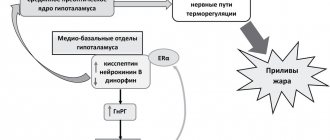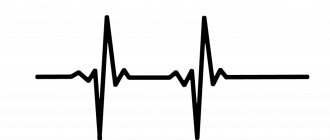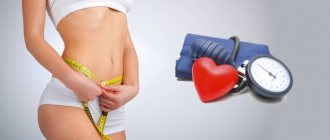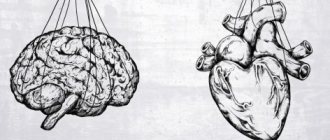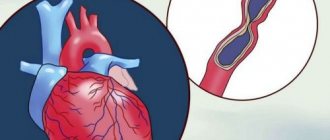doctor
One of the most difficult periods in a woman’s life is undoubtedly the period of cessation of the menstrual cycle, the production of estrogen and progesterone. Symptoms: temperature changes, night sweats, decreased libido, vaginal dryness, nervousness, sometimes depression, migraines and joint pain.
Stopping estrogen production leads to several disorders:
- Decreased levels of good cholesterol and increased levels of bad cholesterol, and as a result, increases the risk of cardiovascular disease
- Thinning of bone mass (decreased density), development of osteoporosis
- Many women approaching menopause notice unexplained weight gain and an increase in fat tissue, especially in the abdominal area, despite all attempts to lose weight
Moreover, with age, the incidence of obesity in them progresses, especially after menopause, against the background of a decrease in the secretion of ovarian hormones, the total amount of fat increases and is redistributed to the anterior abdominal wall, and the mass of muscle and bone tissue decreases.
An increase in body weight and the formation of abdominal obesity against the background of a deficiency of sex hormones is explained by changes in the energy balance and regulation of fat cells, enhanced by glucocorticoid stimulation in postmenopause, the resting metabolic rate decreases.
Due to the metabolic consequences of a long period of dysregulated energy balance, not only does the mass of adipose tissue increase, but also the amount of muscle tissue decreases. One of the main mechanisms of the influence of sex hormones on adipose tissue is a direct effect on the activity of lipoprotein lipase, the main enzyme regulating the accumulation of triglycerides in adipocytes.
In women of reproductive age, lipoprotein lipase stimulates estrogens in the adipose tissue of the thighs and buttocks, where the activity of this enzyme is higher than in the subcutaneous fat of the abdominal region.
As a result, lipids accumulate to ensure adequate energy reserves during pregnancy and lactation.
After menopause, lipoprotein lipase activity decreases, and adipocytes of the femoral-gluteal region decrease in size, and a relative redistribution of fat occurs.
Hot flashes during menopause
The resulting feeling of heat, covering the face, neck, chest and accompanied by sweating, a feeling of shortness of breath, and often dizziness, is a common symptom of menopause. This rolling sensation of heat is called hot flashes. Hot flashes during menopause are associated with a violation of the general thermoregulation of the body caused by hormonal changes.
Unfortunately, it is rare that a woman does not experience hot flashes during menopause. However, the frequency of hot flashes can be reduced several times if you adhere to fairly simple rules: avoid overheating, do not wear excessively warm clothes, refrain from hot food and foods that increase the metabolic rate, such as tea, pepper, coffee, energy-based caffeine
Treatment of hot flashes and their prevention
The ovary is the shortest-lived endocrine gland, and when it stops producing hormones, a replacement must be found.
Typically a combination of natural estrogens (most often estradiol) and progestogens is used.
Depending on the age, diseases and desires of the woman, treatment is agreed upon, which can be:
- cyclically combined (simulates the menstrual cycle);
- continuously combined (no cycle).
Usually it lasts up to 5 years, and if necessary, longer. Hormonal treatment has many benefits: it reduces symptoms such as hot flashes and night sweats, insomnia, headaches, mood swings, helps with dry and thin skin, and hair loss. It also has a protective effect on the nervous system, heart, blood vessels, atrophic changes in the female reproductive system, suppresses atherosclerosis, osteoporosis and reduces the risk of developing senile dementia.
Contraindications:
- estrogen-dependent breast cancer or a high risk of its occurrence;
- active thromboembolism;
- liver disease;
- cardiac ischemia;
- pregnancy;
- undiagnosed uterine bleeding;
- uterine fibroids and endometriosis.
Heat in the feet
Complaints of heat in the feet are quite common. They say that “feet are on fire.” This may be a sign of a serious violation of microcirculation - blood supply in the small vessels of the legs, which is especially dangerous for people suffering from obesity or diabetes. In this case, you must definitely consult a doctor. An in-depth instrumental examination of the vessels of the legs may be required.
Another common cause of burning in the feet is a fungal infection of the skin. To exclude this option, it is necessary to be tested for fungal flora.
Diagnostics
The woman is first referred to a gynecologist in order to identify changes in the reproductive system, which most often manifest themselves with such symptoms. When diagnosing menopausal attacks, the doctor mainly focuses on complaints, the number and duration of hot flashes. A consultation with an endocrinologist is also scheduled. To detect the causes of hot flashes, the following laboratory and instrumental studies are used:
- Hormonal profile.
The level of estrogen and progesterone, pituitary hormones FSH, LH and prolactin are determined in the blood. To detect other endocrine diseases, T3 and T4, glucocorticoids and ACTH, and insulin are measured. To check bone metabolism, a test for parathyroid hormone and calcitonin is recommended. - Gynecological examination.
During a standard vaginal examination, the doctor pays attention to atrophic or inflammatory changes in the vagina, takes a smear for microbiological analysis and oncocytology. Before prescribing hormonal drugs, an ultrasound of the mammary glands or mammography is performed. - Sonography.
An ultrasound of the pelvic organs is done to exclude gynecological pathology. If hot flashes are accompanied by cardiac symptoms, echocardiography is mandatory. Ultrasound of the thyroid gland is indicated for suspected thyroiditis, hormonally active cysts and nodes. - Methods of instrumental visualization.
To diagnose thyroid diseases, the results of X-ray studies - pneumography, angiography, computed tomography - are indicative. Scintigraphy of the thyroid gland is informative. To determine the localization of tumors in carcinoid syndrome, CT or MRI of internal organs and endoscopy are required.
Hormone replacement therapy is a method of treating hot flashes in women
General feeling of heat
A feeling of heat throughout the body may be a consequence of a systemic metabolic disorder caused by a hormonal disease. In this case, a disease of the thyroid gland, gonads or adrenal glands can be suspected. If you are worried about feeling hot, you should definitely visit an endocrinologist. A laboratory blood test will be required for an accurate diagnosis.
Fever accompanied by chills is a sure sign of illness. As a rule, fever and chills indicate damage to the body by some kind of infection, but it is also possible that this is a symptom of a more serious, autoimmune disease (rheumatism, systemic lupus erythematosus). If you have a fever accompanied by chills, you should immediately consult a general practitioner and conduct an examination to accurately determine the cause.
Menopausal waves
Hot flashes are most often associated with perimenopause or menopause, when there is a sudden drop in estradiol, one of the three estrogens synthesized in a woman's body.
Up to 45% of early postmenopausal women wake up every other night due to hot flashes and sweating. Two-thirds of them said they were chronically sleep-deprived as a result.
Associated with this are mental disorders that destroy quality of life through the so-called “domino effect.” Waves of nightly hot flashes and sweats lead to insomnia, which causes irritability, anxiety, depression, emotional lability, fear of aging and loss of attractiveness, and finally a drop in energy and libido.
An interesting study conducted in the US involving 60,000 women over 10 years found that women who experienced hot flashes during perimenopause and menopause were less susceptible to heart and cardiovascular disease.
Treatment of menopause in men
Andropause in men is not a disease, but is used to describe the age-related symptoms listed above. It is often the case that symptoms are caused by physical, life or psychological problems.
- Stressful situations at work, financial problems - all this reduces libido and causes problems with sleep;
- Excessive drinking and lack of exercise can make you feel lethargic and reduce muscle mass;
- Lack of understanding and quarrels in the family provoke depression.
What methods of treating menopause in men do doctors use?
If you are experiencing several of the symptoms described above, make an appointment with your doctor so that he can find out what may be causing the problem.
Discuss the symptoms with your doctor, tell us when possible signs of menopause began, and in addition, the doctor will prescribe an examination in the form of hormone tests and a general blood test. Based on their findings, your doctor will be able to recommend a number of different treatments. Some treatment options include making lifestyle changes such as eating better, exercising, giving up alcohol and smoking, or prescribing cognitive behavioral therapy or taking medications.
Treatment will depend on what symptoms you have and what is causing them. In any case, treatment should be preceded by a thorough diagnosis, taking into account the results of appropriate blood tests, symptoms, medical history, lifestyle and physical examination, as well as screening for prostate cancer.
Ask a Question. Make an appointment by phone
8 (843) 207-18-00
The difference between traditional and biomedicine approaches
When various symptoms occur (decreased sexual desire, fat deposition in the abdominal area, high blood pressure and the development of other cardiovascular diseases), men turn to different specialists, each of whom makes a separate diagnosis - from hypertension to prostatitis. From each doctor the patient receives his own recommendations and a specific set of pills. Unfortunately, this approach can lead to dire consequences.
Traditional medicine in the treatment of men, as they say, “hits the tails”: sleeping pills, blood pressure medications, genital blood circulation and potency stimulants are prescribed.
For example, beta blocker drugs designed to lower blood pressure lead to an even greater drop in testosterone levels, worsen the condition of the prostate gland, promote obesity, increase cholesterol and destroy blood vessels. For its part, reduced testosterone provokes the further development of hypertension - this closes the circle.
To compensate for all these side effects, the patient is additionally prescribed testosterone hormones. As a result, a man becomes dependent on drugs for the rest of his life, while the risks of developing atherosclerosis, fatty liver, strokes and heart attacks, obesity and oncology remain.
Bioreparative medicine, first of all, suggests eliminating the oxidation of lipids and proteins, starting cell regeneration and restoring adrenal function. That is, create conditions under which the body regulates itself and begins to produce more testosterone. And a normal level of testosterone will automatically lower cholesterol, cleanse the liver of fat, restore potency and libido, improve sleep and mood, and relieve chronic fatigue and irritability. And the most important thing is that at the end of the recovery program, the man will no longer be dependent on taking any pills. Now he will be able to withstand great physical and mental stress, be active, play sports, and feel like a leader again.
Introduction
Good news, the World Health Organization considers the age group 45-59 to be “average”, but right behind it is “older” 60-74. That is why many doctors believe that up to 45 (a young age), in most cases, to maintain health, you can do without any serious therapy, including hormonal therapy. However, after 45 years, the functions of organs and systems may decline, which requires monitoring and, if necessary, treatment.
Hormones are substances produced by internal glands that regulate all metabolic processes in the human body. The change in their activity with age is considered by many scientists as a central link in the aging process (the theory of V.N. Dilman, 1983). The word "hormone", from the Greek "hormao", means "to quickly bring into action", "to raise" or "to excite". It was invented by the British physiologist Ernst Starling in 1905.
In her book The Brain of the Sexes, Anna Moire writes: “What really sets men and women apart, testosterone, literally shapes our brains and our creativity, intelligence, way of thinking, energy, desire to understand different things. It influences and controls not only the potential we possess, but also the benefit we derive from it. It controls our sexual and communicative behavior."
The steroid hormone testosterone in men is produced in the testicles. It is he who makes men out of men. It has a biological effect on almost all organs and tissues.
At 10-12 years of age (puberty), increased production of testosterone begins, which leads to:
- rapid growth of muscles and bones (anabolic effect)
- hair growth on the pubis, in the armpit
- deepening of the voice
- increased activity of the sebaceous glands (juvenile acne)
- change in character (adolescence)
- the emergence of interest in the opposite sex (appearance of libido)
Historically, the absence of all these changes could be seen in teenage singers in Italy, who were castrated in order to maintain a high timbre of the voice.
Testosterone levels peak at the age of 20, when we are active, energetic, cheerful, and in good physical shape (no obesity).
Starting at age 30, testosterone levels decline by about 1-2% per year. The prevalence of hypogonadism (low testosterone) in men is 6%, and in obesity and diabetes - more than 50%.
Unlike female menopause (“step” in French), the age-related decrease in testosterone occurs gradually, and therefore is not so acutely felt by men. As a rule, the first symptoms appear at the age of 50, their number increases like a “snowball”. Unsuspecting men begin to literally “fall apart before our eyes,” go to different doctors (cardiologist, endocrinologist, neurologist, urologist), and take handfuls of various medications for a large number of diseases. The trouble is that all of them do not treat the cause, but only act on the symptoms of the disease. And only competent doctors can assume the presence of age-related androgen deficiency and recommend donating blood from a vein to determine the level of total testosterone.
Menopause: first symptoms and age
Menopause is manifested by the following symptoms:
- Irregular periods
- Unstable hormonal levels
- Hot flashes, sweating
- Frequent mood swings, depression, anxiety
- Decreased sex drive
- Deterioration of skin condition, hyperemia
- Sleep disorder
- Absent-mindedness
- Dry mucous membranes
- Enuresis
- Weight gain
There are three stages of menopause: premenopause, menopause and postmenopause.
Premenopause
Onset: 40–45 years, lasts up to ten years. Signs of premenopause:
- Destabilization of menstruation
- Frequent urination
- Increased thermal sensitivity
- Weight gain
- Skin problems
If you start to notice the above, it's time to see a doctor. Do not ignore the first signs so as not to develop problems with the heart, blood vessels and nerves in the future.
Menopause
Occurs between the ages of 49 and 55 years. At this stage it is impossible to conceive a child. Menopause is characterized by:
- Dysmenorrhea
- Aging skin
- Tides
- No lubrication in the vagina
- Brittle bones
Hot flashes are the most noticeable sign of menopause. The duration is approximately two minutes. Manifestations:
- Slight disorientation
- Feeling of heat in the upper body
- Hyperemia of the face and chest
- Sweat, palpitations
- Anxiety
Hot flashes do not pose a health risk. When this state occurs, it is advisable to find complete peace and take a deep breath. You can exclude the reasons that aggravate its manifestation: control emotions, give up spicy food, coffee and alcohol, do not wear excessively warm clothes, minimize stay in a stuffy room.
Important!
If hot flashes cause persistent discomfort, see a doctor.
Postmenopause
The third stage of menopause, postmenopause, begins around age 55 and lasts for about six years. The ovaries completely stop functioning. Postmenopausal symptoms:
- Pubic descent
- Lack of lubrication in the vagina
- Hair loss on the head
- Decreased vision
- Weight gain
Let's talk separately about perimenopause.
It begins with perimenopause and ends one year after the last menstruation.
As research by scientists from the Kharkov National Medical University has shown, one of the leading complaints with which 20-30% of women in the perimenopausal period turn to a gynecologist is uterine bleeding. They occupy a leading place among the reasons for women's hospitalization in hospitals. Excessive blood loss creates a risk of iron deficiency anemia, increases the risk of developing cancer, causes disruption of sexual life, and reduces quality of life. A common cause of uterine bleeding in the perimenopausal period is endometrial polyps. In women of older age groups, bleeding can occur not only with benign changes in the uterine mucosa, but also against the background of endometrial cancer. Peak incidence occurs between 55 and 65 years of age.
Accompanying manifestations
In some representatives of the fair half of humanity, especially after 60 years, the symptom is accompanied by a feeling of causeless fear or anxiety.
A woman during a hot flash experiences the following symptoms:
- your head suddenly starts to hurt;
- lack of fresh air;
- pulse quickens;
- dizziness appears;
- profuse sweating;
- hand trembling;
- nausea.
Some female representatives may be bothered by only one of the listed manifestations, while others may have several or even all of them. The intensity of manifestation is always purely individual. Some ladies have mild symptoms, while others are very worried. At its most severe, a woman can briefly lose consciousness.
When do tides occur? This symptom appears randomly. He is able to disturb a lady throughout the day or at night. Several times in a row or an isolated incident. Many women complain that hot flashes bother them at night. If night attacks of hot flashes occur regularly, then the woman may experience insomnia.
Hormone therapy for men
It is much easier to regulate the hormonal status of the male body than the female body, and this is good news for representatives of the stronger half of humanity. However, while women have long been accustomed to the idea that they need maintenance therapy during the premenopausal period, men are extremely wary of such an idea.
At Expert Clinics, we pay special attention to treating men and have developed the most comfortable methods for them. We prescribe strictly individually selected medications to patients, containing hormones in very small dosages.
Our advantage is that we adhere to the French school of endocrinology and work in accordance with biological circadian rhythms. That is, we take into account the hormone release curve: which of them are released in the evening and which in the morning. The drug intake program is developed individually for each man, and during the process of hormonal therapy, we make sure to study the dynamics of the metabolites that are produced when these hormones are broken down.
After leveling out the production of hormones, complete oncoprotection (protection against cancer) is launched, and the man’s prostate gland stops enlarging.
And soon after the start of therapy, the man notices that his erection, libido, and sexual function have been restored, which is also extremely important for self-esteem. Men regain confidence, sleep is restored - and a whole new world opens up for them.
